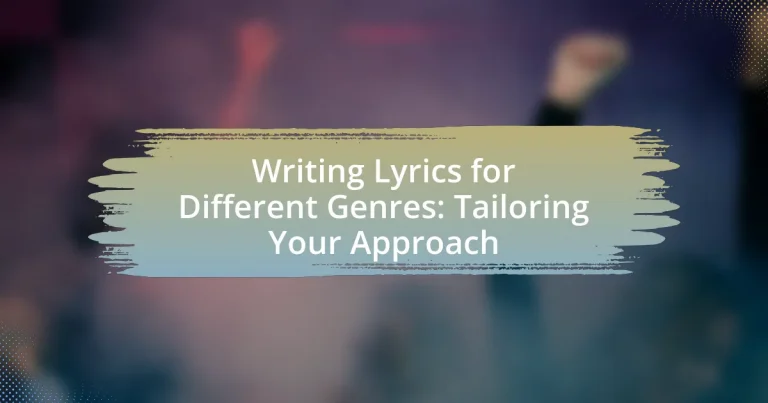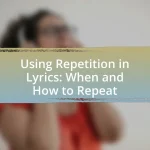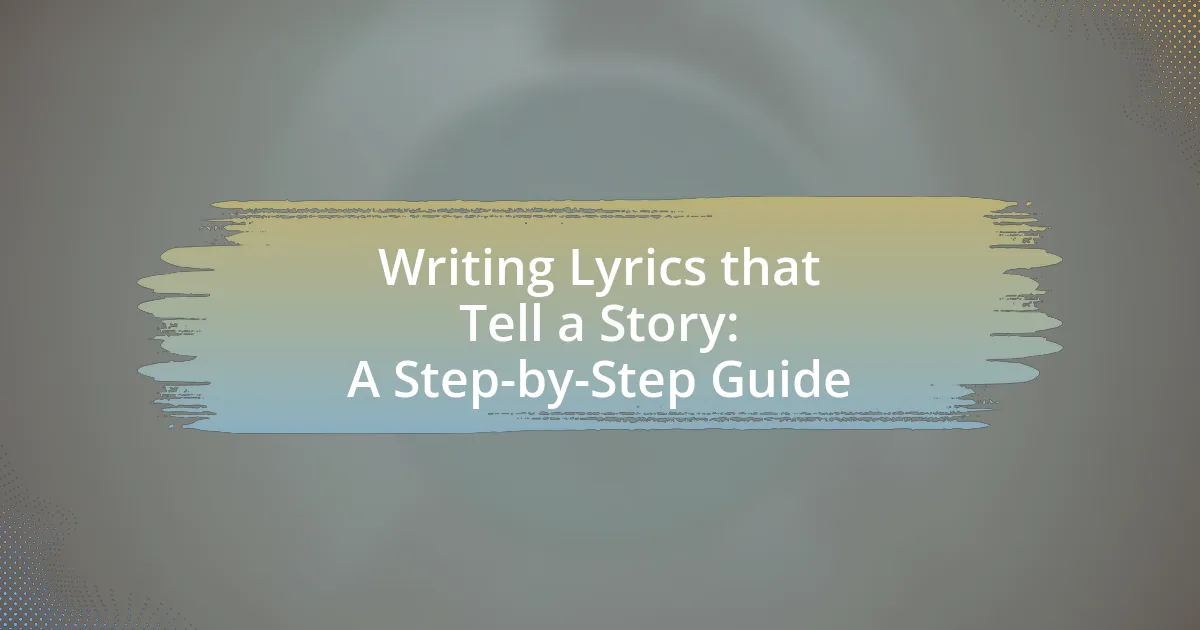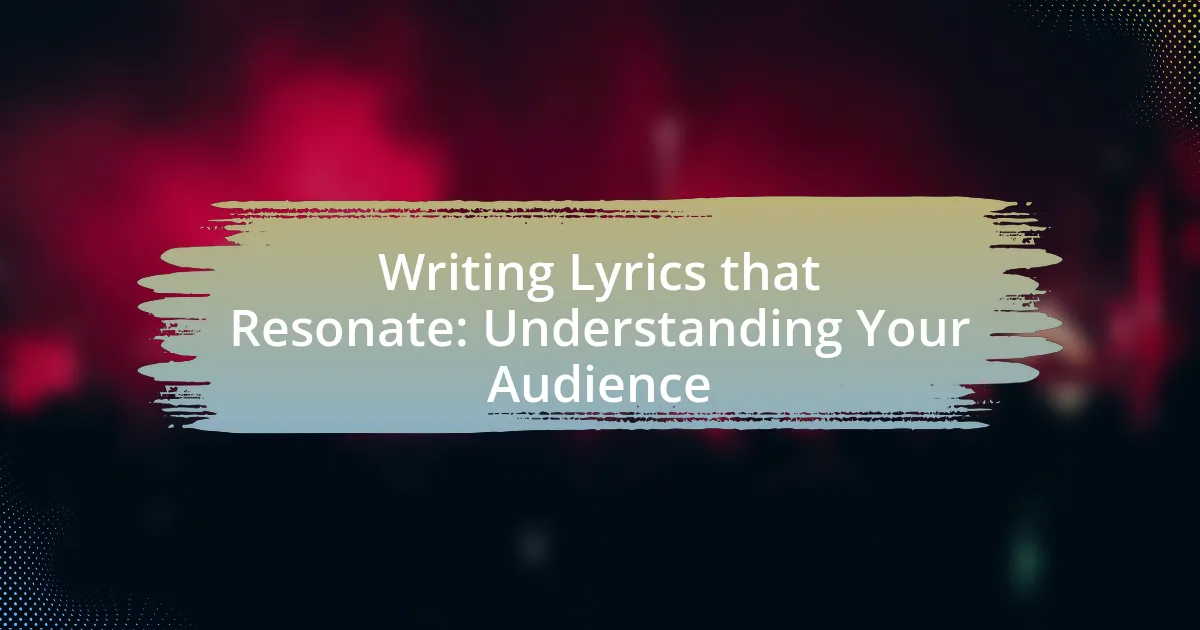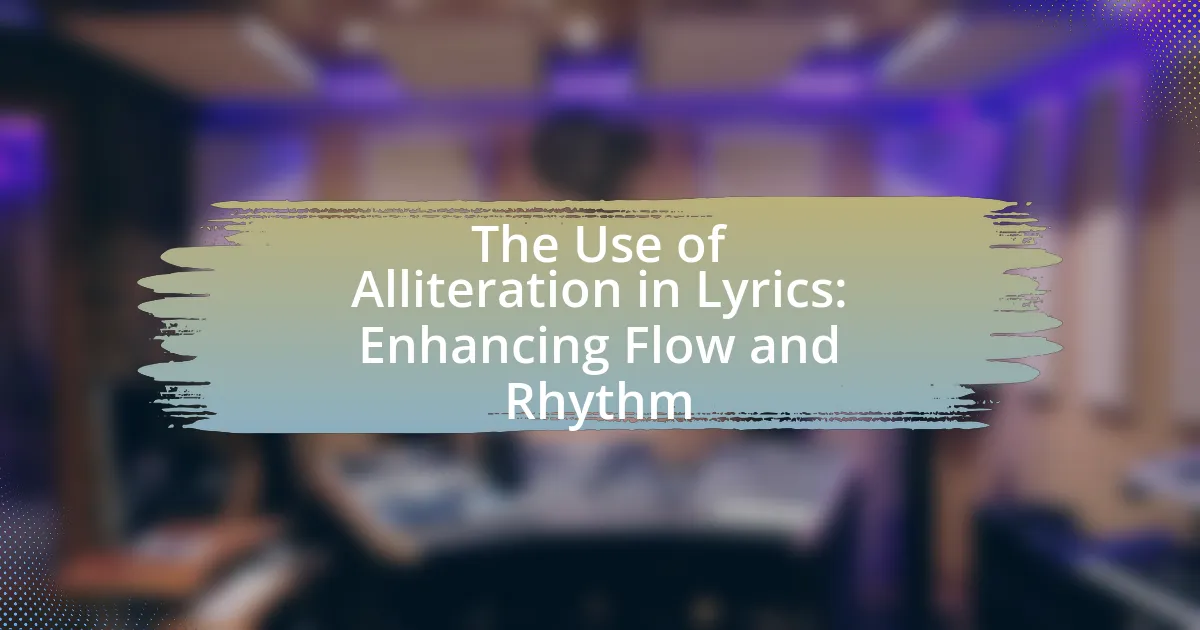The article focuses on the intricacies of writing lyrics for different music genres, emphasizing the need to adapt lyrical content, style, and structure to align with the conventions of each genre. It explores how genre characteristics influence lyric writing, detailing the thematic and structural differences across genres such as pop, rock, country, and hip-hop. The article also highlights the importance of cultural contexts in shaping lyrical themes, the risks of a one-size-fits-all approach, and best practices for effective lyric writing. Additionally, it provides practical tips and resources for aspiring lyricists to enhance their skills and understand genre-specific conventions.
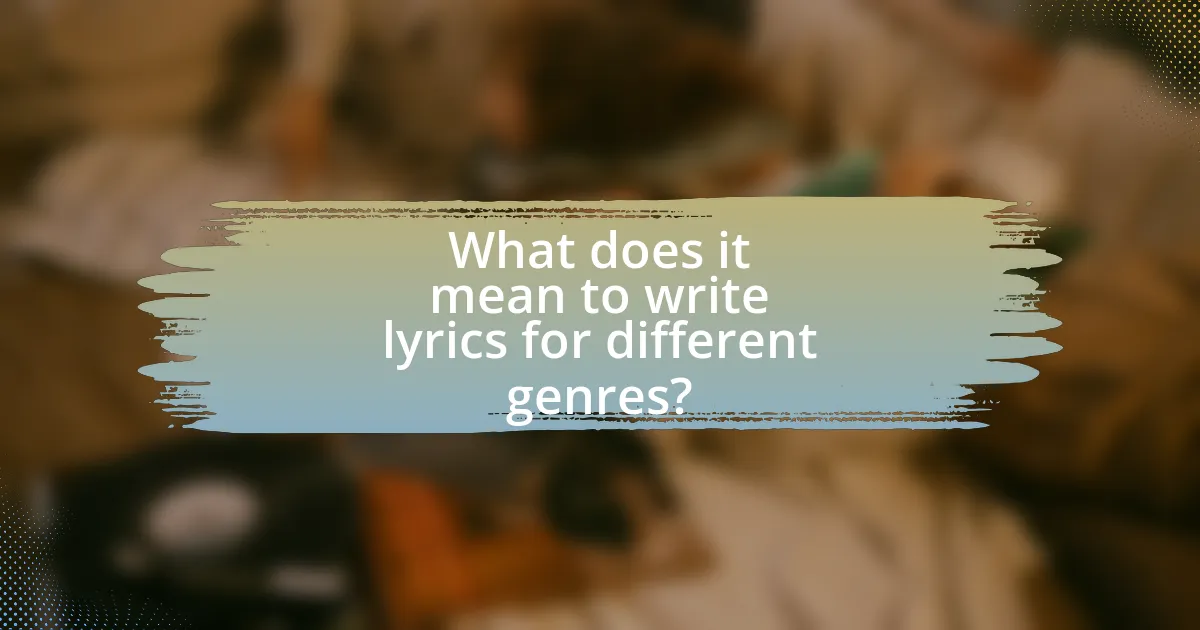
What does it mean to write lyrics for different genres?
Writing lyrics for different genres means adapting the lyrical content, style, and structure to fit the conventions and emotional expressions typical of each genre. Each genre, such as pop, rock, country, or hip-hop, has distinct themes, rhythms, and storytelling techniques that influence how lyrics are crafted. For example, pop lyrics often focus on catchy hooks and relatable themes, while country lyrics may emphasize storytelling and personal experiences. This adaptability is essential for resonating with the target audience and aligning with the musical elements of the genre, ensuring that the lyrics enhance the overall impact of the song.
How do genre characteristics influence lyric writing?
Genre characteristics significantly influence lyric writing by dictating themes, language, and structure. For example, country music often emphasizes storytelling and personal experiences, leading to lyrics that are narrative-driven and relatable. In contrast, hip-hop frequently utilizes rhythm and wordplay, resulting in lyrics that focus on clever rhymes and social commentary. Additionally, pop music tends to favor catchy hooks and repetitive structures, which shape the lyrical content to be more accessible and memorable. These distinctions are evident in the works of artists like Johnny Cash, whose storytelling in songs like “A Boy Named Sue” exemplifies country lyricism, and Kendrick Lamar, whose intricate wordplay in tracks like “Alright” showcases hip-hop’s focus on rhythm and social issues. Thus, the characteristics of each genre directly inform the approach and style of lyric writing.
What are the defining features of popular music genres?
Popular music genres are characterized by distinct musical elements, themes, and cultural influences. For instance, pop music often features catchy melodies, repetitive structures, and relatable lyrics, appealing to a broad audience. Rock music is defined by its use of electric guitars, strong rhythms, and themes of rebellion or personal struggle. Hip-hop emphasizes rhythmic vocal delivery, often incorporating social commentary and storytelling. Country music typically includes narrative lyrics, acoustic instruments, and themes of love, heartbreak, and rural life. Each genre’s defining features reflect its cultural roots and audience preferences, shaping the way artists create and perform their music.
How do cultural contexts shape lyrical themes in different genres?
Cultural contexts significantly shape lyrical themes across different music genres by influencing the subjects, emotions, and narratives that resonate with audiences. For instance, hip-hop often reflects socio-political issues, personal struggles, and community experiences, rooted in the African American experience, as seen in the works of artists like Kendrick Lamar, who addresses systemic racism and identity. In contrast, country music frequently draws on themes of rural life, love, and nostalgia, reflecting the values and experiences of Southern American culture, as exemplified by songs from artists like Dolly Parton. Furthermore, genres like reggae incorporate themes of resistance and spirituality, influenced by Rastafarian culture, as demonstrated in Bob Marley’s lyrics. These examples illustrate how cultural contexts provide a framework that informs the lyrical content, making it relevant and relatable to specific audiences.
Why is it important to tailor your approach to different genres?
Tailoring your approach to different genres is crucial because each genre has distinct conventions, themes, and audience expectations. For instance, pop music often emphasizes catchy hooks and relatable lyrics, while country music frequently tells a story with vivid imagery. Adapting to these specific characteristics enhances the effectiveness of the lyrics and resonates more deeply with the intended audience. Research indicates that songs that align with genre expectations are more likely to achieve commercial success, as evidenced by Billboard chart data showing genre-specific trends in listener preferences.
What are the risks of using a one-size-fits-all approach in lyric writing?
Using a one-size-fits-all approach in lyric writing risks alienating audiences and diluting the emotional impact of the lyrics. This method fails to account for the unique characteristics and cultural nuances of different music genres, which can lead to lyrics that feel generic and uninspired. For instance, country music often emphasizes storytelling and personal experiences, while hip-hop may focus on rhythm and wordplay. By not tailoring lyrics to fit these specific styles, songwriters may miss the opportunity to connect deeply with listeners, resulting in lower engagement and commercial success.
How can understanding genre conventions enhance lyrical effectiveness?
Understanding genre conventions enhances lyrical effectiveness by providing a framework that guides the structure, themes, and emotional resonance of the lyrics. When songwriters are aware of the specific characteristics and expectations of a genre, they can craft lyrics that resonate more deeply with the audience, as these lyrics align with familiar patterns and motifs. For example, country music often emphasizes storytelling and personal experiences, while hip-hop frequently focuses on rhythm and wordplay. This alignment with genre conventions not only increases listener engagement but also improves the likelihood of commercial success, as songs that adhere to genre norms are more readily accepted by audiences and radio stations.
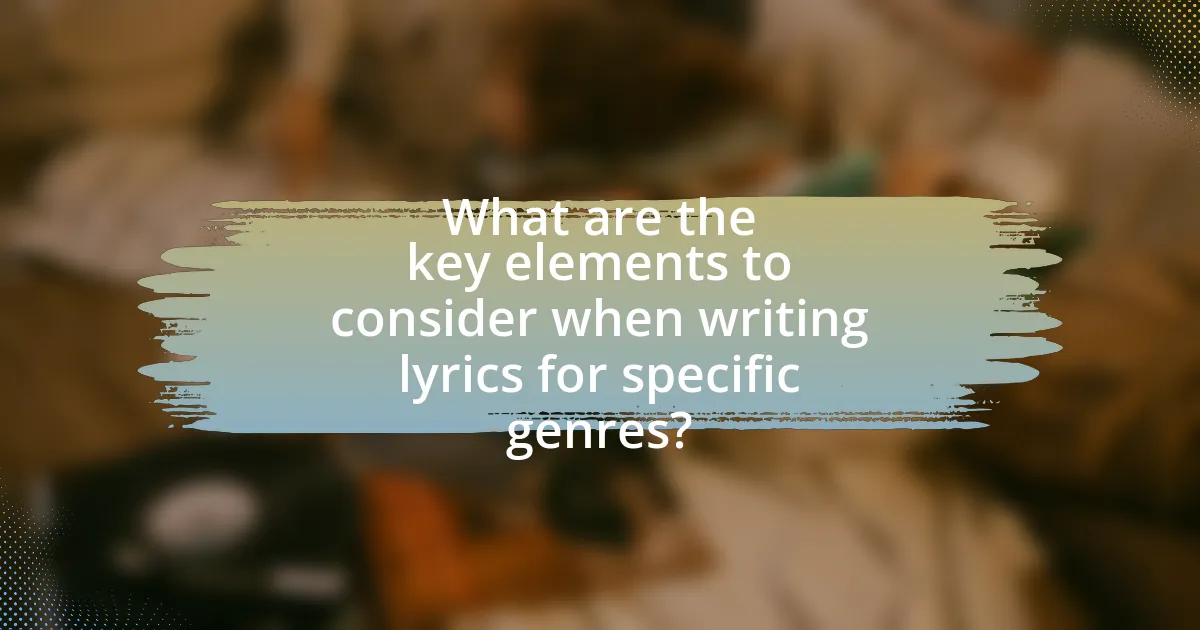
What are the key elements to consider when writing lyrics for specific genres?
When writing lyrics for specific genres, key elements include thematic relevance, language style, and structural conventions. Each genre has distinct themes; for example, country music often explores storytelling and personal experiences, while hip-hop frequently addresses social issues and self-identity. The language style must align with the genre’s audience; pop lyrics tend to be catchy and straightforward, whereas rock may incorporate more complex metaphors. Additionally, structural conventions vary; for instance, many pop songs follow a verse-chorus-verse format, while folk music may prioritize narrative flow. Understanding these elements ensures that lyrics resonate with the intended audience and fit the genre’s expectations.
How does the structure of a song vary across genres?
The structure of a song varies significantly across genres, with each genre adhering to distinct conventions. For example, pop songs typically follow a verse-chorus structure, often featuring a catchy hook, while rock songs may incorporate bridges and solos, emphasizing instrumental sections. In contrast, hip-hop often utilizes a verse-chorus format but places greater emphasis on rhythm and lyrical flow, with verses that can be longer and more complex. Country music frequently employs storytelling, with verses that build a narrative leading to a memorable chorus. These structural differences reflect the unique characteristics and audience expectations of each genre, influencing how lyrics are crafted and delivered.
What are common lyrical structures in pop, rock, and hip-hop?
Common lyrical structures in pop, rock, and hip-hop include verses, choruses, and bridges, often arranged in a pattern that enhances the song’s emotional impact. In pop music, the typical structure is verse-chorus-verse-chorus-bridge-chorus, which emphasizes catchy hooks and memorable melodies. Rock music frequently follows a similar structure but may incorporate more complex arrangements and instrumental solos, often using verse-chorus-verse-chorus-solo-chorus. Hip-hop, on the other hand, often features verses that are longer and more intricate, with a structure that can include multiple verses and a repeated hook, typically formatted as verse-verse-chorus-verse-chorus. These structures are supported by the genre’s conventions, where pop focuses on accessibility, rock emphasizes musicality, and hip-hop prioritizes lyrical complexity and rhythm.
How do verses, choruses, and bridges differ in various genres?
Verses, choruses, and bridges differ significantly across musical genres in structure, function, and thematic content. In pop music, verses typically set up a narrative or emotional context, choruses deliver a catchy, memorable hook, and bridges provide a contrasting section that adds depth. In contrast, in rock music, verses often focus on storytelling with more complex lyrics, choruses emphasize powerful, anthemic lines, and bridges may introduce instrumental solos or shifts in dynamics. In hip-hop, verses are often longer and more intricate, showcasing lyrical skill, while choruses are usually repetitive and catchy, serving as a hook. Bridges in hip-hop can include spoken word or additional verses that enhance the narrative. Country music often features storytelling in verses, a singable chorus, and bridges that may reflect on the song’s themes or emotions. These structural differences reflect the unique conventions and audience expectations within each genre.
What role do themes and emotions play in genre-specific lyrics?
Themes and emotions are crucial in genre-specific lyrics as they shape the narrative and connect with the audience. Different music genres evoke distinct emotional responses; for instance, country music often explores themes of love, loss, and nostalgia, while hip-hop frequently addresses social issues and personal struggles. This alignment of themes and emotions with genre conventions enhances listener engagement and relatability. Research indicates that songs with emotionally resonant lyrics can lead to increased listener retention and sharing, demonstrating the importance of effectively integrating these elements in songwriting.
How can personal experiences be adapted to fit different genres?
Personal experiences can be adapted to fit different genres by altering the tone, language, and themes to align with genre conventions. For instance, in country music, personal stories often emphasize nostalgia and storytelling, while in hip-hop, experiences may focus on social issues and personal struggles, using a more direct and rhythmic language. This adaptability is supported by the understanding that each genre has specific emotional and stylistic expectations; for example, pop music often prioritizes catchy hooks and relatable themes, while rock may emphasize rebellion and intensity. By recognizing these differences, writers can effectively tailor their personal narratives to resonate with the intended audience of each genre.
What are common themes in country music versus R&B?
Common themes in country music include storytelling about love, heartbreak, rural life, and personal struggles, while R&B often focuses on romantic relationships, emotional expression, and social issues. Country music frequently highlights narratives of everyday life and personal experiences, as seen in songs like “Jolene” by Dolly Parton, which tells a story of love and jealousy. In contrast, R&B songs like “A Change Is Gonna Come” by Sam Cooke address broader societal themes, including civil rights and personal empowerment. These thematic differences reflect the distinct cultural backgrounds and emotional focuses of each genre.
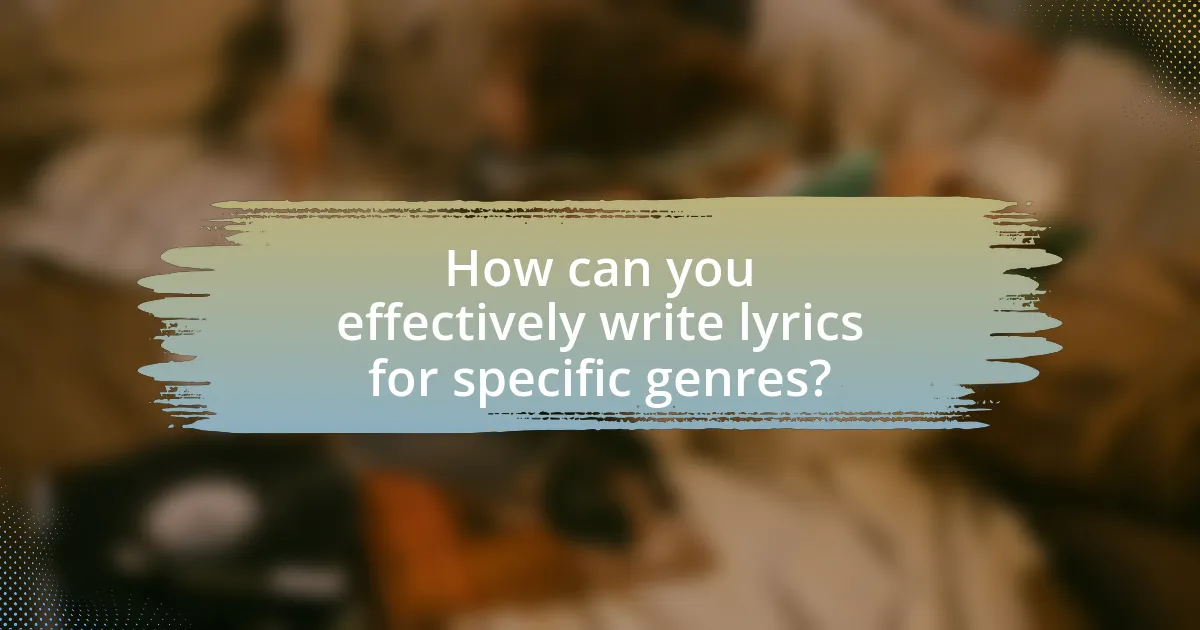
How can you effectively write lyrics for specific genres?
To effectively write lyrics for specific genres, you must understand the conventions and themes typical of each genre. For instance, country lyrics often focus on storytelling and personal experiences, while hip-hop emphasizes rhythm, wordplay, and social commentary. Familiarizing yourself with the genre’s common structures, such as verse-chorus formats in pop or the narrative style in folk, enhances your ability to craft authentic lyrics. Additionally, analyzing successful songs within the genre provides insight into effective language, imagery, and emotional resonance, which can guide your writing process.
What techniques can help in writing genre-specific lyrics?
To write genre-specific lyrics, utilize techniques such as studying genre conventions, employing thematic elements, and mimicking stylistic features. Understanding the unique characteristics of a genre, such as the storytelling methods in country music or the rhythmic patterns in hip-hop, allows lyricists to align their writing with audience expectations. For instance, country lyrics often focus on personal narratives and relatable experiences, while hip-hop frequently incorporates wordplay and social commentary. Additionally, analyzing successful songs within the genre can provide insights into common phrases, structures, and emotional tones, which can enhance the authenticity of the lyrics.
How can you use imagery and metaphor effectively in different genres?
Imagery and metaphor can be used effectively in different genres by aligning them with the emotional tone and thematic elements specific to each genre. For instance, in country music, vivid imagery of landscapes and personal experiences can evoke nostalgia and connection, while in hip-hop, metaphor can serve to convey complex social issues and personal struggles, enhancing the lyrical depth. Research indicates that effective use of imagery and metaphor can increase listener engagement and emotional resonance, as seen in studies analyzing lyrical content across genres, which show that songs with strong imagery and metaphor tend to have higher emotional impact and memorability.
What are the best practices for collaborating with genre-specific musicians?
The best practices for collaborating with genre-specific musicians include understanding the unique characteristics of the genre, maintaining open communication, and respecting each other’s creative processes. Understanding genre-specific elements, such as lyrical themes, instrumentation, and stylistic nuances, allows collaborators to create music that resonates with the intended audience. Open communication fosters a collaborative environment where ideas can be shared freely, leading to innovative outcomes. Respecting each other’s creative processes ensures that all contributors feel valued, which enhances the overall collaboration. These practices are supported by successful collaborations in the music industry, where artists like Taylor Swift and Ed Sheeran have effectively blended genres by adhering to these principles.
What resources are available for aspiring lyricists?
Aspiring lyricists can access a variety of resources to enhance their skills and creativity. These resources include online platforms such as Genius, which provides a vast database of song lyrics and annotations, allowing lyricists to analyze and learn from established artists. Additionally, songwriting workshops and courses offered by organizations like Berklee Online and Coursera provide structured learning and feedback from industry professionals. Books such as “Writing Better Lyrics” by Pat Pattison offer practical techniques and exercises for lyric writing. Furthermore, collaboration with other musicians and participation in songwriting communities, both online and offline, can foster creativity and provide valuable insights. These resources collectively support aspiring lyricists in developing their craft and understanding different genres.
How can songwriting workshops enhance your genre-specific skills?
Songwriting workshops enhance genre-specific skills by providing targeted instruction and feedback tailored to particular musical styles. Participants engage in exercises that focus on the unique elements of their chosen genre, such as lyrical structure, thematic content, and stylistic nuances. Research indicates that hands-on practice in a collaborative environment fosters creativity and skill development, as evidenced by a study published in the Journal of Music Therapy, which found that structured workshops significantly improved participants’ songwriting abilities across various genres. This focused approach allows songwriters to refine their craft, gain insights from experienced instructors, and receive constructive critiques, ultimately leading to a deeper understanding of genre conventions and improved songwriting proficiency.
What online tools and communities can support lyric writing?
Online tools and communities that support lyric writing include platforms like Songwriting Pro, which offers resources and networking opportunities for songwriters, and websites such as RhymeZone, which provides rhyming dictionaries and thesaurus features to enhance lyric creativity. Additionally, communities on social media platforms like Reddit, specifically the r/Songwriting subreddit, allow lyricists to share their work, receive feedback, and collaborate with others. These resources are validated by their active user bases and the wealth of information they provide, making them effective for lyric writing across various genres.
What are some practical tips for writing lyrics across genres?
To write lyrics effectively across genres, focus on understanding the unique characteristics and themes of each genre. For instance, pop lyrics often emphasize catchy hooks and relatable themes, while country lyrics may tell a story with vivid imagery and emotional depth. Additionally, consider the rhythm and structure typical of the genre; hip-hop often utilizes complex rhyme schemes and wordplay, whereas rock may favor straightforward narratives.
Incorporating genre-specific language and cultural references can enhance authenticity. For example, using colloquial expressions in country music can resonate with listeners, while abstract concepts may work better in indie or alternative genres.
Listening to and analyzing successful songs within the target genre provides insight into effective lyrical techniques. Research shows that familiarity with genre conventions significantly improves songwriting skills, as noted in studies on music composition and genre analysis.
